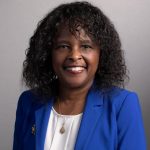When former ACR President Joseph Flood, MD, tapped Deborah Dyett Desir, MD, to volunteer for an ACR committee, he might have assumed that her preference would be to serve on the Committee on Rheumatologic Care or its Insurance Subcommittee. After all, Dr. Desir is in private practice at the Arthritis and Osteoporosis Center PC in Hamden, Conn., which she founded in 1993, and those committees could have been a good fit for her. She also serves as a clinical assistant professor of medicine at Yale, is president elect of the New Haven County Medical Association and is a member of the Finance Committee for the Connecticut State Medical Society.
Dr. Desir’s preference, however, was to become a member of the ACR’s Government Affairs Committee (GAC). She had already participated in the ACR-sponsored Advocates for Arthritis on Capitol Hill and had lobbied the Connecticut Congressional delegation about patient care issues. She was eager to do more.
“I think, as citizens in a representative democracy, we have to be active,” she says.
Skin in the Game
Dr. Desir has been interested, and active, in politics since childhood and says that recruiting for causes and candidates comes easy to her. To colleagues who have yet to engage in the political arena, Dr. Desir says, “It should be clearer and clearer, with pages of regulations and laws pertaining to healthcare, that we are already very much involved [in politics]. What’s happening politically affects our ability to take care of our patients.”
She encourages the physicians in her practice to donate to RheumPAC and thinks every member of the ACR should consider investing. She acknowledges that some may be concerned that RheumPAC is nonpartisan. She is herself a staunch Democrat, but supports RheumPAC because it “deals with issues, not candidates, and is very specifically talking about rheumatology patient issues.”
Where to Start?
In addition to urging rheumatologists to contribute to RheumPAC, Dr. Desir says members should start by contacting the local offices of their Congressional representatives. Physicians needn’t feel reticent to contact their local representatives to lobby for patient care issues, she says. In Dr. Desir’s experience, “Even if you are taking up a point with which [the representative doesn’t] necessarily agree, they will listen respectfully and give a thoughtful answer. Representatives want to hear from constituents, and their local staffs are happy to talk to you,” she says.
When it comes to patient care issues, rheumatologists will not be flying solo. “Remember,” Dr. Desir emphasizes, “The ACR is a resource, and its staff are more than happy to help.” Dr. Desir has accessed the ACR’s expertise furnished by the Government Affairs staff on many occasions and found it to be invaluable.
“What Can I Do at Home?”
Dr. Desir joined the GAC in 2010 and soon realized she wanted to do more. She thought, “What can I do at home?” and explored the possibility of working for local candidates in her home district with whom her politics and patient care concerns aligned. The seated Congressional representative, Rosa DeLauro, a Democrat for Connecticut’s third district, had solid support and would be reelected. On the other hand, the Democratic candidate for the Senate was a newcomer.
A local group, the Hill Top Brigade, was planning to lend support to Democrat Christopher Murphy, who had announced his candidacy for U.S. Senator. Not only did Dr. Desir and her husband canvas for Mr. Murphy door to door in nearby Fairfield County, they took their support to the next level by hosting a fundraiser for the candidate in 2011, and met their goal of raising $20,000. Planning and staging for that event were similar to other events she has since hosted for Congresswoman DeLauro and Connecticut Senior Senator Richard Blumenthal.
To get events in her home on a politician’s calendar, Dr. Desir relies on the candidate’s scheduler. The campaign staff sends out invitations to its list of previous donors. Then Dr. Desir personally sends out “hundreds of emails to people” she hopes will be interested. To that list of invitees, she adds members of many varied groups to which she belongs, including the Town of Woodbridge Democratic Committee, the Connecticut State Medical Society, her church book group, her neighborhood book group and the New Haven County Medical Society.
“The ACR Government Affairs staff is always extremely helpful in contacting Connecticut physician organizations and political action committees,” she adds. The state and county medical societies are also willing to include announcements of the events in their respective emails to members. Dr. Desir enlists friends from diverse backgrounds to be on her “host committee” in an effort to enlarge and diversify the pool of potential attendees.
Although others who hold fundraisers may enlist their host committee members to contribute food and beverages, Dr. Desir always uses a caterer for the events at her home. She doesn’t provide entertainment, but if there are other elected officials present, she invites them to say a few words in addition to the candidate’s remarks. The cost to Dr. Desir, in her words, is “a large campaign contribution.” The campaign may sometimes pay the caterer; alternatively, she pays the caterer as an “in-kind” campaign contribution.
Advice for How to Get Involved
Dr. Desir advises anyone interested in hosting events “to call the local campaign and let them know that you would like to host a fundraiser. There may even be a sign-up link on the campaign website. The first time that I gave a fundraiser, I asked the ACR staff to contact the campaign for me. I would recommend forming a small committee of friends to help with organization, emailing, food, set-up, clean-up, etc. The campaign staff will be an invaluable resource.”
Hosting fundraising events “doesn’t always have to be about big dollar amounts,” Dr. Desir points out. For example, her “ask” for a 2012 event, “Hats On for Obama,” was $20 a person. The goal was to reach out to women in New Haven who didn’t necessarily have a lot of money, but who could help with getting out the vote on Election Day. “It was a Sunday afternoon and 300 church ladies came with their hats on to my backyard,” she recalls. Publicity about the event got the attention of the state Democratic Party and other officials who came to engage with their constituents. So hosting events can provide an opportunity for constituents to present issues to elected officials. And asking for money for what you consider a good cause or a good candidate is “almost easy.”
Dr. Desir stresses again the resources the ACR can furnish for such events. “They will help you with position statements about issues pertaining to patient care, patient access to treatment and government support for research.” For more information on how you can get involved, visit the ACR’s Legislative Action Center or email ACR Government Affairs staff at [email protected].
Editor’s note: It’s not too late to make your 2017 contribution to RheumPAC. Act today. All contributions to RheumPAC are voluntary and must be made with personal funds. RheumPAC can accept funds only from ACR/ARHP members who are U.S. citizens or permanent resident aliens.
Gretchen Henkel is an award-winning health and medical journalist based in California.


